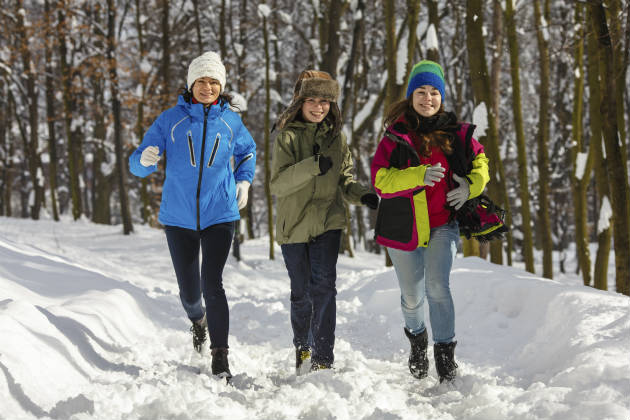Winter does have its downsides. It’s cold, dark and the days just seem to disappear – where did the summer go? That being said, this super-cold season isn’t as bad as people believe.
If we catch a cold or put on a few pounds, we’re quick to blame winter. But in many instances, the season is wrongly accused. From oldwives tales to common misconceptions, we’re separating winter fact from fiction.
If we catch a cold or put on a few pounds, we’re quick to blame winter. But in many instances, the season is wrongly accused. From oldwives tales to common misconceptions, we’re separating winter fact from fiction.

Myth 1: You can’t exercise in winter
This would be a great excuse to kick off the running shoes and sit in front of the TV, but the truth is, exercising in winter is perfectly fine. Research published in Medicine & Science in Sports and Exercise claims that it’s actually better for you than running in warmer climates. The cold forces us to pick up the pace, encouraging a faster, harder workout. It burns calories and increases endorphin levels, resulting in a healthier, happier you.
Myth 2: The cold air makes you sick
A classic line from mum – ‘wrap up warm or you’ll catch a cold.’ And whilst the drop in temperature can exacerbate feelings of sickness, there’s no definitive proof that it causes a cold directly. Only by coming into contact with the germs themselves can you become sick. Flu expert Doctor Thomas Tallman of Cleveland Clinic says we’re “more likely to catch a cold indoors, where it's warm and crowded than outdoors in the chilly air.
Myth 3: Less sunlight causes depression
The combination of bad weather and shorter days can make us feel down in the dumps. However, there’s nothing to suggest that the lack of sunshine during winter causes widespread depression. Some do suffer from Seasonal Affective Disorder (SAD) during this time – a condition that triggers depression-like symptoms such as lethargy, tiredness and withdrawal from family and friends. But this only tends to affect a small percentage, 3-6% of people in the UK. Family and financial stresses are more likely to cause winter blues than a shortage of sunlight.
Myth 4: You can drink less in winter
Whilst you might not feel the need to drink as much water during winter, it’s important to always stay hydrated, whatever the season. During the summer months, the hot and humid climates make us sweat, and naturally we reach for an ice-cold drink. But as you’ll agree, this is less tempting when the temperatures hit freezing outside. Hydration effects everything from energy to concentration, so be sure to top-up the hot teas and water during winter.
Myth 5: Sun cream in winter? Don’t be silly
Despite the lack of sunshine, you still need to apply some level of protection to your skin during the colder months, especially if you’re jetting off for some winter sun. Even skiing and snowboarding trips come with risks. The UV rays reflect off the snow, and this can cause skin damage.
The sudden exposure to sunlight after being wrapped up indoors can have a huge impact on your skin, so it’s better to be on the safe side. By using an SPF all year round, you reduce the risk of skin cancer and keep your skin looking smooth and healthy.
The sudden exposure to sunlight after being wrapped up indoors can have a huge impact on your skin, so it’s better to be on the safe side. By using an SPF all year round, you reduce the risk of skin cancer and keep your skin looking smooth and healthy.
Myth 6: Winter = weight gain
As much as we’d like to blame the change in season for weight gain, research proves that we’ve no reason to eat more during winter. Medical Director of the Bariatric Institute in Ottawa, Dr. Yoni Freedhoff says “We do know that in hibernating animals there will be seasonal changes in hunger hormones, but there is nothing to suggest that that’s true in people.” The sudden desire for comfort food and cosy nights in comes from our wish to avoid the winter – the cold, the stress, the dark nights – not because we have a biological need to increase our calorie intake.
Myth 7: Winter makes the allergies disappear
If your winter cold won’t budge, it could be allergies. There’s a common misconception that summer is allergy season. However, winter brings its’ own irritants. Being stuck indoors; in warm, temperate climates can flair up itchy eyes, tickly throats and constant sneezes. The best way to distinguish between the two is the length of your symptoms – common colds only tend to last a few days, a week at the maximum. If your symptoms persist for a long period of time, it’s likely to be allergies.
Myth 8: Winter makes your hair fall out
The stress of winter might cause your hair to fall out, but the season itself isn’t the culprit. Research even suggests that summer could potentially be the worst season for hair loss. A 6-year study conducted by the University Hospital of Zurich found that the ladies tested lost the least amount of hair during winter. The cold can make hair dry and brittle, and reconditioning treatments can help with this.
Myth 9: Alcohol makes you warm
Winter is a great time for socialising, but remember: alcohol doesn’t increase your body’s temperature. The warm feeling you experience when enjoying a glass of wine or beer is the blood dilating and rushing to your cheeks, making them nice and rosy. This is only temperamental and can be dangerous, as your body isn’t actually as warm as you think it is. You may misjudge the icy-cold temperatures because of the instant feeling alcohol provides – so be careful.

No comments:
Post a Comment